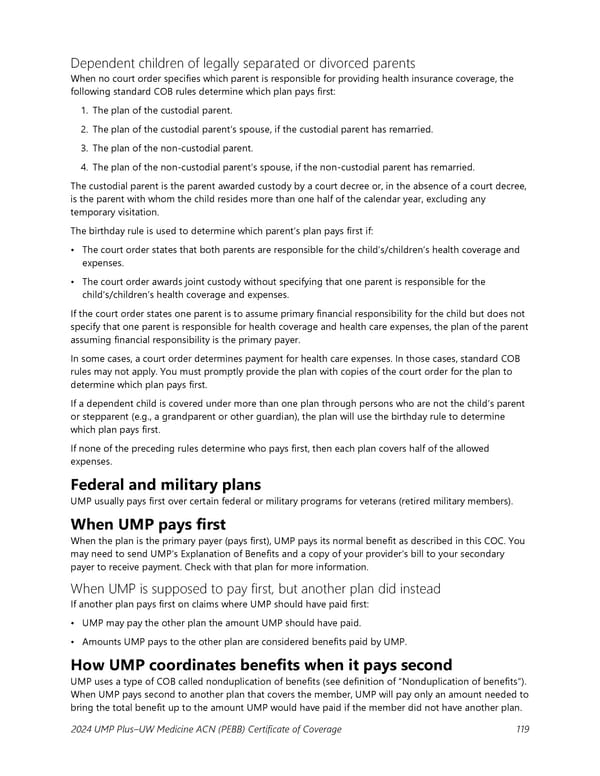Dependent children of legally separated or divorced parents When no court order specifies which parent is responsible for providing health insurance coverage, the following standard COB rules determine which plan pays first: 1. The plan of the custodial parent. 2. The plan of the custodial parent’s spouse, if the custodial parent has remarried. 3. The plan of the non-custodial parent. 4. The plan of the non-custodial parent’s spouse, if the non-custodial parent has remarried. The custodial parent is the parent awarded custody by a court decree or, in the absence of a court decree, is the parent with whom the child resides more than one half of the calendar year, excluding any temporary visitation. The birthday rule is used to determine which parent’s plan pays first if: • The court order states that both parents are responsible for the child’s/children’s health coverage and expenses. • The court order awards joint custody without specifying that one parent is responsible for the child’s/children’s health coverage and expenses. If the court order states one parent is to assume primary financial responsibility for the child but does not specify that one parent is responsible for health coverage and health care expenses, the plan of the parent assuming financial responsibility is the primary payer. In some cases, a court order determines payment for health care expenses. In those cases, standard COB rules may not apply. You must promptly provide the plan with copies of the court order for the plan to determine which plan pays first. If a dependent child is covered under more than one plan through persons who are not the child’s parent or stepparent (e.g., a grandparent or other guardian), the plan will use the birthday rule to determine which plan pays first. If none of the preceding rules determine who pays first, then each plan covers half of the allowed expenses. Federal and military plans UMP usually pays first over certain federal or military programs for veterans (retired military members). When UMP pays first When the plan is the primary payer (pays first), UMP pays its normal benefit as described in this COC. You may need to send UMP’s Explanation of Benefits and a copy of your provider’s bill to your secondary payer to receive payment. Check with that plan for more information. When UMP is supposed to pay first, but another plan did instead If another plan pays first on claims where UMP should have paid first: • UMP may pay the other plan the amount UMP should have paid. • Amounts UMP pays to the other plan are considered benefits paid by UMP. How UMP coordinates benefits when it pays second UMP uses a type of COB called nonduplication of benefits (see definition of “Nonduplication of benefits”). When UMP pays second to another plan that covers the member, UMP will pay only an amount needed to bring the total benefit up to the amount UMP would have paid if the member did not have another plan. 2024 UMP Plus–UW Medicine ACN (PEBB) Certificate of Coverage 119
 UMP Plus–UW Medicine Accountable Care Network (UW Medicine ACN) COC (2024) Page 119 Page 121
UMP Plus–UW Medicine Accountable Care Network (UW Medicine ACN) COC (2024) Page 119 Page 121